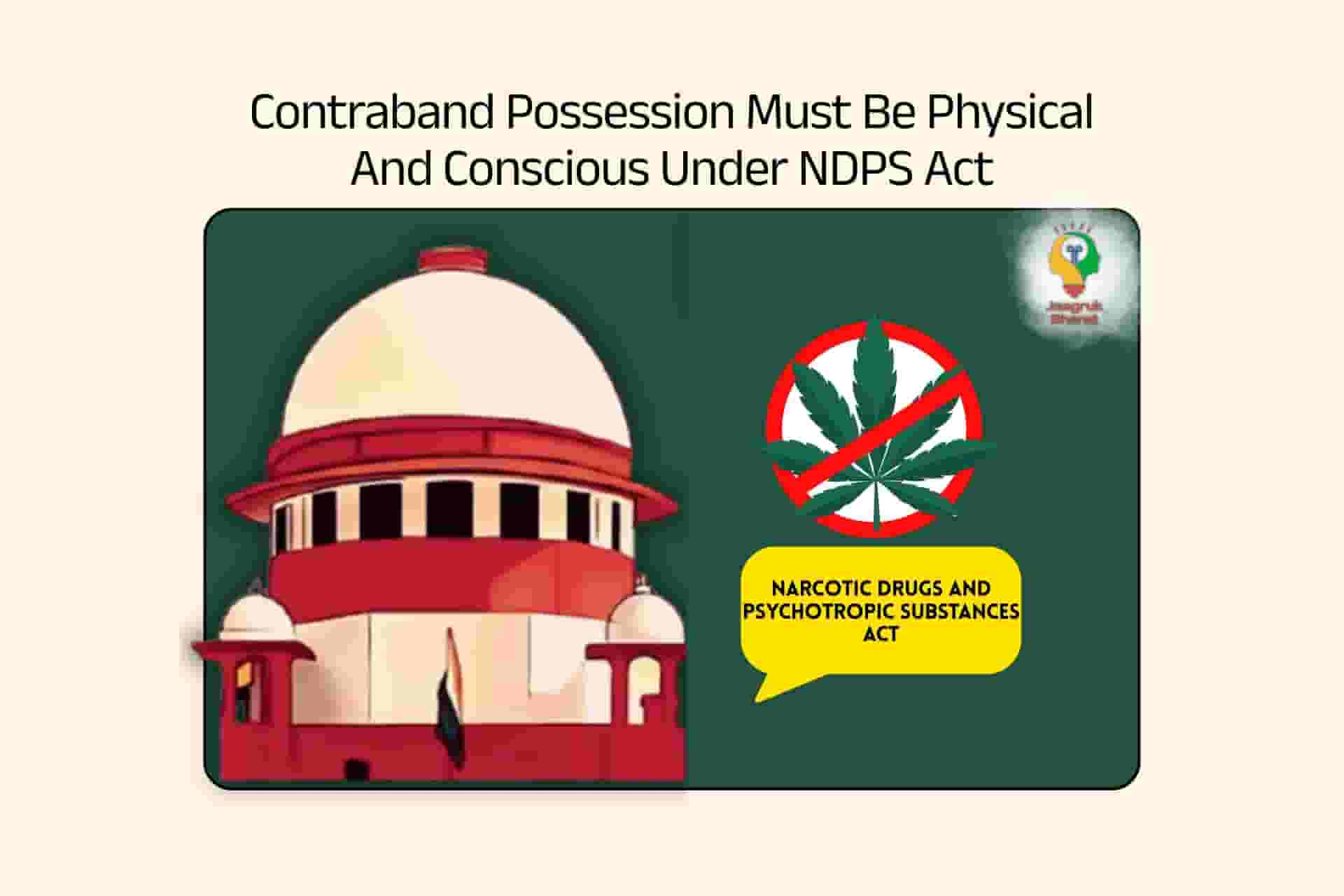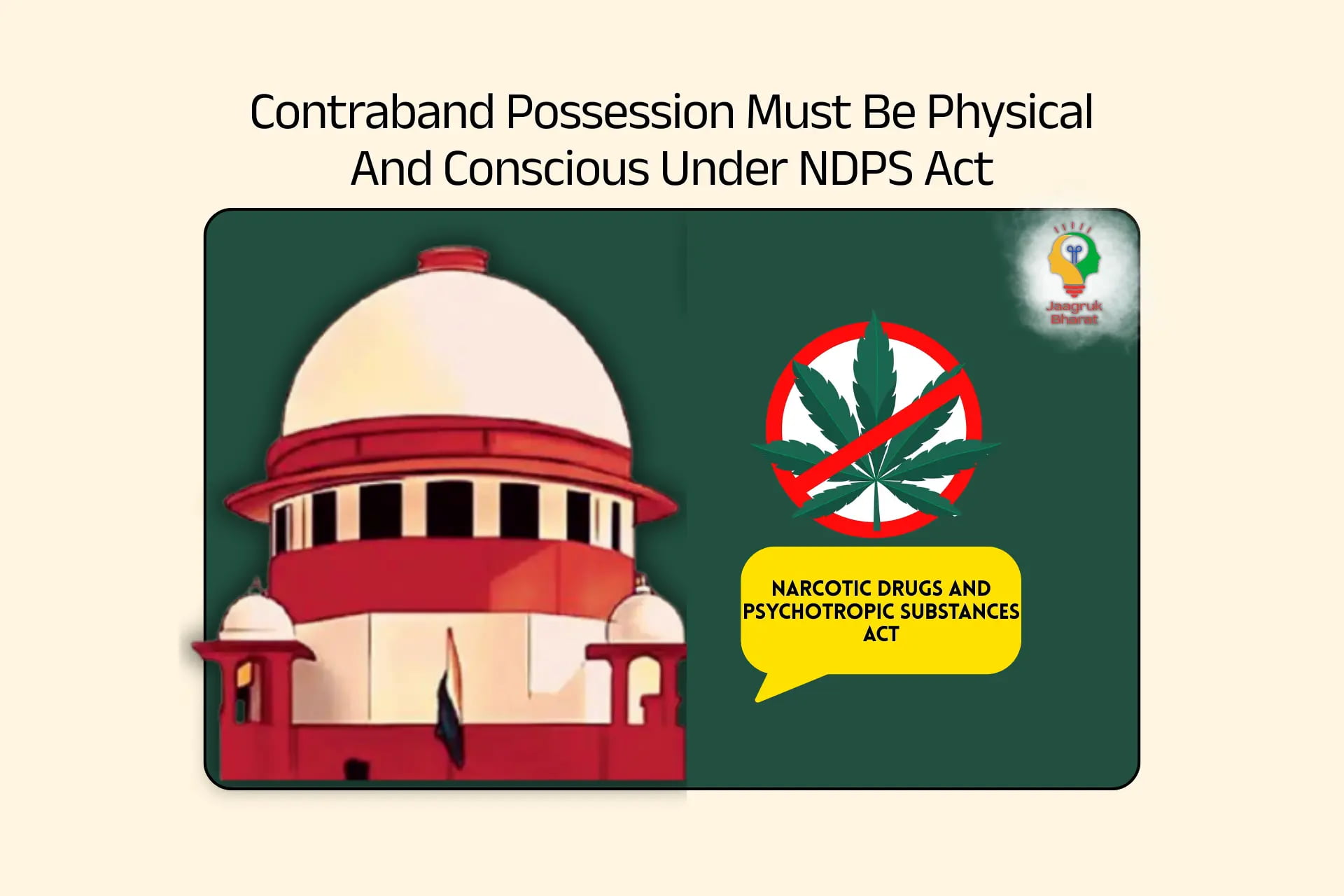Supreme Court: Contraband Possession Must Be Physical And Conscious Under NDPS Act
Updated: 08-10-2025 at 5:33 PM
1k


The concept of "conscious possession" under the Narcotic Drugs and Psychotropic Substances (NDPS) Act of 1985 has been reiterated by the Supreme Court of India. The Court made it clear that possession under NDPS requires both physical control and mental consciousness of the contraband. This judgment arose from an appeal against the order of the Madhya Pradesh High Court, which had upheld the conviction of an accused under the Act for having 50 kg of poppy husk.
The Key Highlights Of The Judgment
The Term Conscious Possession
The Court defined conscious possession as knowing about and controlling illegal contraband. Both factors must be proven by the prosecution to establish guilt.
Background Of The Case
A young man was detained on a train. He was carrying three cartons with 50 kg of poppy husk. The authorities took the cartons. The accused could not explain how he came to have them. After this the Trial Court sentenced the accused to 10 years and a fine of ₹1,00,000, which the High Court upheld.
Reasons For The Supreme Court
The court gave the following reasons:-
-
The burden on the prosecution: The court ruled it must prove the accused had conscious possession of the contraband.
-
Presumption of Guilt: Section 54 of the NDPS Act says, if possession is proved, the accused is guilty unless proven otherwise.
Rejection Of The Defence
The Court rejected the accused's claim. He said he did not know the cartons' contents and had carried them only at the officers' request. The Court found clear evidence of his conscious possession.
Legal Provisions Noted
Under Section 54, if the accused cannot explain their possession, the law presumes them guilty. Also, Section 35 assumes the accused had certain intent and knowledge unless they can prove otherwise.
The Effect Of The Judgment On Individual Rights
The Supreme Court's clarification of "conscious possession" seeks to reconcile the demands of society with the exercise of individual rights. By requiring both physical control of a thing and an awareness of the thing possessed, the judgment sought to ensure the protection against wrongful convictions of innocent persons. Such interpretation reinforces the rule that the prosecution has the burden of proof and provides an effective safeguard against the abusive application of the stringent provisions under the NDPS Act.
Challenges Faced By Law Enforcement In Establishing Conscious Possession
Establishing "conscious possession" under NDPS Act cases was often a challenging process faced by law enforcement agencies. While establishing the fact of awareness of the individual is a complicated process that requires considerable detail and proof of credible evidence, this judgment bears down heavily on rigorous procedural diligence like procuring direct evidence or reliable witnesses to allow justice without wrongful convictions.
Conclusion
The Supreme Court affirmed the conviction while reiterating that under Section 5 of the NDPS Act, the feeling of possession must consist of two elements: physical and conscious possession or awareness. The judgment indicates the importance of the prosecution's proof of conscious possession before the transfer of the onus on the accused. The appellant was directed to surrender in eight weeks.
Get the latest updates on government schemes and policies with Jaagruk Bharat. Join India's biggest Jaagruk Bharat Community. Share your thoughts, questions, and your favourite topic for us to cover.
Frequently Asked Questions
0
0
1k
0
0
1k Views
0
No comments available





Our Company
Home
About
T&C
Privacy Policy
Eula
Disclaimer Policy
Code of Ethics
Contact Us
Cancellation & Refund Policy
Categories
Women
Insurance
Finance
Tax
Travel
Transport & Infrastructure
Food
Entertainment
Communication
Government ID Cards
E-commerce
Traffic guidelines
Miscellaneous
Housing and Sanitation
Sports
Startup
Environment and Safety
Education
Agriculture
Social cause
Employment
Disclaimer: Jaagruk Bharat is a private organization offering support for documentation and government scheme access. We are not affiliated with any government body. Official services are available on respective government portals. Our goal is to make processes easier and more accessible for citizens.
All Copyrights are reserved by Jaagruk Bharat